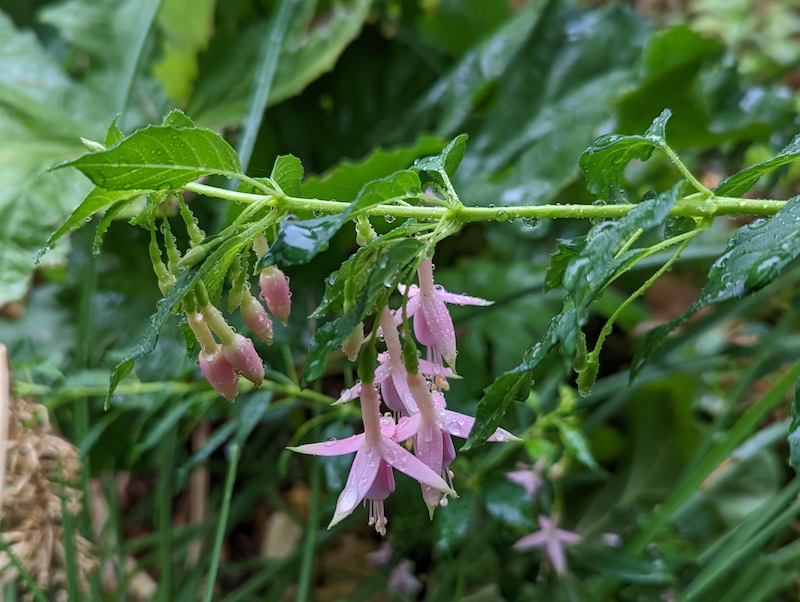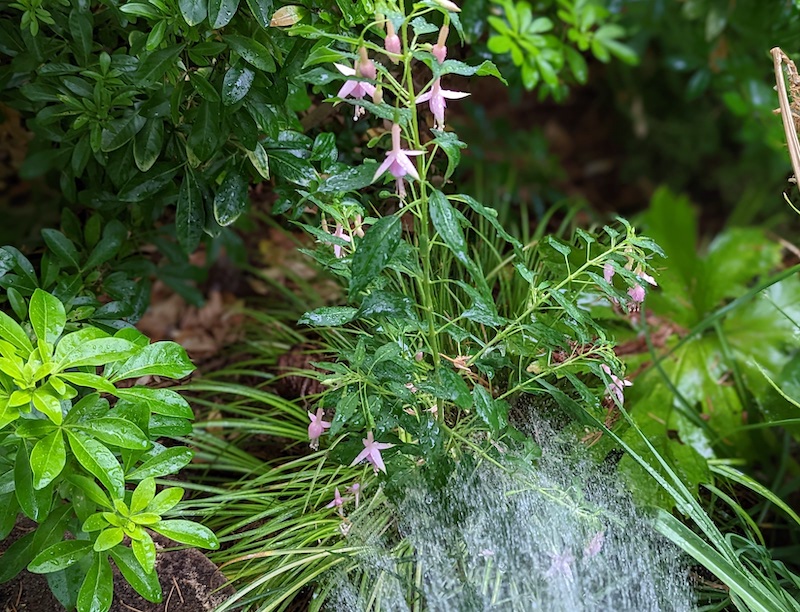Fuchsias are ornamental plants that need consistent attention to watering. The heavy blooming and fast growth require large amounts of water and nutrients. Fuchsia also needs well-draining soil, a cool root zone, and proper watering. Organic mulches can improve the soil's ability to hold moisture.

How To Tell If Fuchsia Needs to be Watered
Fuchsia will begin to droop very quickly when it needs watering. The older leaves will fall off if the plant is left without water. Fuchsia will revive when given a thorough watering and time in the shade to recover. If the plant undergoes multiple dry spells, it will get stressed and redirect all of its energy to protect the root growth. A rejuvenation pruning and a dose of fertilizer will help the plant to resume flowering.
How Often To Water Fuchsia
Fuchsia requires consistent watering to look its best. The soil in the garden or container should feel like a well wrung-out sponge: not too soggy and never left to dry out completely. Typically 1 - ½ inches of water is needed each week. During a long hot or dry spell, you may need to water daily during the summer.
Fuchsia planted in the ground will produce deeper root structures in the soil and is less likely to suffer from heat or dry weather. Drip irrigation or soaker hoses are a great way to ensure that plants are efficiently and thoroughly watered with little evaporation or overspray. Mulching early in the summer helps the root system stay cool and helps the soil retain moisture, cutting down on watering frequency.
Water potted Fuchsia until the water runs out of the bottom of the pot. This ensures that all of the soil is evenly moist. Drip irrigation is easily arranged for containers and hanging baskets, making your watering schedule more convenient.

Best Time To Water Fuchsia
Fuchsia needs to be watered early in the day, so that any moisture that gets on the foliage has time to dry completely before nightfall. Mildews and rusts are common diseases of Fuchsia and are promoted by atmospheric conditions and wet foliage. Watering early in the day helps hydrate the plant before afternoon heat sets in. Fuchsia that is being overwintered will need far less watering. Dormant plants placed in a dark, cool spot will only need to be checked for watering once a month.
The soil should remain drier than during the growing season but not so dry that it shrinks away from the sides of the container. Fuchsia growing as a houseplant over the winter should also be kept drier than usual. Once a week, feel the soil for dryness. The top 1-2 inches can be dry before watering. The plants will grow much slower than in the summer and take up less moisture.
How to Water Fuchsia
Step 1 - Water regularly
Fuchsia does not tolerate soil that has dried out completely. Repeated dry spells will stress Fuchsia, and prevent it from producing blooms in favor of protecting the roots. The soil should be watered enough to feel like a wrung-out sponge.
Step 2 - Water Fuchsia 1 ½ inches of water weekly
Split the watering up into 2-3 sessions throughout the week. Drip irrigation or soaker hoses direct the water to the root zone with little evaporation or overspray.
Step 3 - Container-grown plants need to be checked for moisture daily
Fuchsia in pots will dry out much faster than those planted in the ground. Small containers dry out faster than large planters. Always irrigate until the water runs out of the drainage holes.
Step 4 - Mulch plants in the ground and in containers
Mulching with compost, finely shredded bark, or pea gravel (on top of potting soil) will help to cool the roots of Fuchsia and slow down the evaporation of moisture from the soil. Mulching will improve the moisture-holding capabilities of garden soils for many seasons.
Fuchsia Watering Tips
- Water consistently
- Use efficient watering methods such as drip irrigation or soaker hoses
- Drip irrigation can be used in containers and hanging baskets
- Mulch plants well to conserve moisture whether they are in the garden or in a pot
 |
Author Robbin Small - Published 9-16-2022 |


